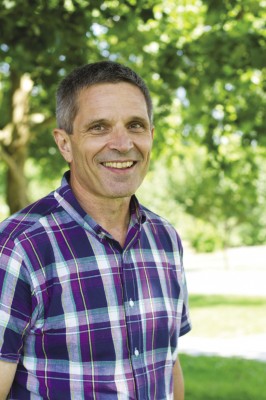
With the Center for Justice and Peacebuilding marking its 20th anniversary in 2014, this issue of Peacebuilder [fall/winter 2013-14] has allowed us to reflect on the complementary journeys of CJP and of the United Nations in seeking to discover and address the roots of violent conflict, rather than simply working to transform ongoing destructive and intractable conflicts.
In this journey, our faculty, staff, students and alumni have enjoyed close collaboration with many UN agencies, often consulting or receiving grant money through the UN’s commendable partnership with a multiplicity of NGOs and civil society organizations. Here is an example from early in CJP’s history: One of the founding faculty members of CJP, Vernon Jantzi, taught in Nairobi in 1996 at a UNICEF-sponsored peace education program.
Two of those in that UNICEF training, John Katunga (MA ’05) and Khadija Ossoble Ali (MA ’01) were inspired to enroll in CJP a few years later. John now directs peacebuilding and justice work in East Africa for Catholic Relief Services. After studying at CJP, Khadija returned to her native country of Somalia to serve in high-level roles in its transitional government from 2000 to 2002. She then came back to the United States and earned a doctorate in conflict analysis and resolution at George Mason University, with a dissertation on the role of political leadership in post-conflict peacebuilding processes
in transitional societies. She encouraged Hassan Sheikh Mohamud, who is now the democratically elected president of Somalia, to attend the 2001 session of our Summer Peacebuilding Institute. Today Mr. Mohamud’s government is the focus of intensive support by the UN to enable it to become stable.
This is just one example of the overlapping roles of CJP and UN agencies, where we all support the work of each other. As Kumar Anuraj Jha says elsewhere in Peacebuilder, it’s important to be humble in this field and to recognize that none of us has all the answers. Thankfully, our signposts for the global journey to peace are getting better. The UN can rightfully feel proud that no new world war has broken out since its founding in 1945. But the number of refugees and displaced people worldwide has never been higher, a sign of how far we still have to go as a world in preventing widespread suffering, rather than simply easing its effects.
Let us join hands and continue to sow the seeds for living in peace. And, let us not forget to engage in personally restorative practices, as we do this difficult work. People who care about healing the world’s wounds should not feel embarrassed by their own need to stay healthy.